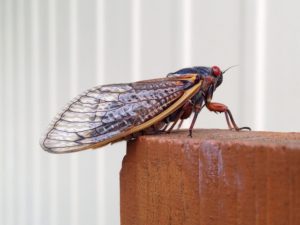
Many people have been “bugging out” about cicadas this year.
Many people have been “bugging out” about cicadas this year. If it’s not the appearance of a cicada that bothers people, it’s the jarring sound that they make. They’ve made their 17-year-return, and we know that you’ve been having questions about how they’ll impact your canine companion and feline friend. Today we will shed some light and clarity on what you can do if your pets decide to chomp down on cicada cuisine.
Cicadas and How They Impact the Digestive Tract
For years, scientists and nutritionists have given people the “okay” to eat insects stating that they’re full of protein. There are over 200,000 types of insects that people digest worldwide. The New York Times and Healthline both advocate this. Healthline, in particular, reported that the nutritional value of insects could rival meat and fruit sources. We fully understand if this doesn’t sound satisfying to your taste palette, but the question becomes: If people can eat bugs, can pets do the same?
The answer isn’t black and white, and there is a gray area. Technically, Brood X isn’t toxic. However, if they aren’t a part of your pet’s regular diet, they can cause discomfort or gastrointestinal issues. Also, rarely, allergic reactions to cicadas may occur. Allergic reaction symptoms may include:
- Facial Swelling
- Itching
- Fever, Vomiting, and Diarrhea (in severe cases)
If your pet swallows a few cicadas, this may not do any harm. However, if they consume a large amount, they will find this exoskeleton hard to digest, which will cause problems. In a nutshell, be wary about the quantity.
How to Keep Your Pets Away From Brood X
Like fleas and ticks, cicadas like to stay in heavily wooded areas. Try opting out of walking through a grassy park and go for a paved trail instead until Brood X leaves in July. While cicadas are out, you also may want to supervise your dog a bit more instead of letting them roam free. If you do let them roam free, check on them from time to time to ensure they aren’t feasting on cicada cuisine. Finally, if you notice any symptoms in your pets, reach out to us immediately.
Here at Mount Carmel Animal Hospital, We’ll Treat Your Pets Like Family!
Mount Carmel Animal Hospital has been serving the Northern Baltimore/Southern York community for over 30 years and is proud to be an independently operated, small animal practice committed to excellence in veterinary medicine and client service. From grooming to wellness services, along with Canine Life Skills Training Courses, and surgical procedures, we have the expertise that will best serve the needs of you and your pet. Contact us at 410-343-0200 and follow us on Facebook!
